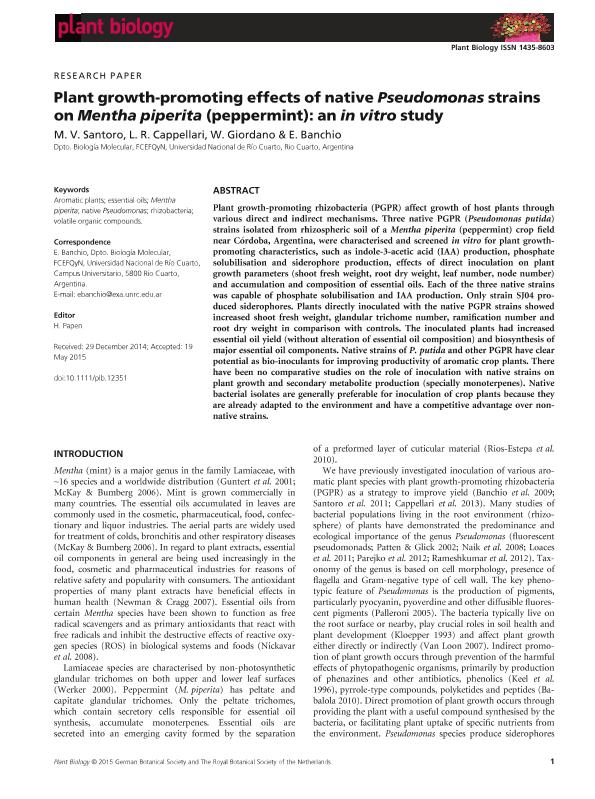Mostrar el registro sencillo del ítem
dc.contributor.author
Santoro, Valeria Maricel

dc.contributor.author
Cappellari, Lorena del Rosario

dc.contributor.author
Giordano, Walter Fabian

dc.contributor.author
Banchio, Erika

dc.date.available
2018-10-02T18:05:05Z
dc.date.issued
2015-11
dc.identifier.citation
Santoro, Valeria Maricel; Cappellari, Lorena del Rosario; Giordano, Walter Fabian; Banchio, Erika; Plant growth-promoting effects of native Pseudomonas strains on Mentha piperita (peppermint): An in vitro study; Wiley Blackwell Publishing, Inc; Plant Biology; 17; 6; 11-2015; 1218-1226
dc.identifier.issn
1435-8603
dc.identifier.uri
http://hdl.handle.net/11336/61522
dc.description.abstract
Plant growth-promoting rhizobacteria (PGPR) affect growth of host plants through various direct and indirect mechanisms. Three native PGPR (Pseudomonas putida) strains isolated from rhizospheric soil of a Mentha piperita (peppermint) crop field near Córdoba, Argentina, were characterised and screened in vitro for plant growth-promoting characteristics, such as indole-3-acetic acid (IAA) production, phosphate solubilisation and siderophore production, effects of direct inoculation on plant growth parameters (shoot fresh weight, root dry weight, leaf number, node number) and accumulation and composition of essential oils. Each of the three native strains was capable of phosphate solubilisation and IAA production. Only strain SJ04 produced siderophores. Plants directly inoculated with the native PGPR strains showed increased shoot fresh weight, glandular trichome number, ramification number and root dry weight in comparison with controls. The inoculated plants had increased essential oil yield (without alteration of essential oil composition) and biosynthesis of major essential oil components. Native strains of P. putida and other PGPR have clear potential as bio-inoculants for improving productivity of aromatic crop plants. There have been no comparative studies on the role of inoculation with native strains on plant growth and secondary metabolite production (specially monoterpenes). Native bacterial isolates are generally preferable for inoculation of crop plants because they are already adapted to the environment and have a competitive advantage over non-native strains.
dc.format
application/pdf
dc.language.iso
eng
dc.publisher
Wiley Blackwell Publishing, Inc

dc.rights
info:eu-repo/semantics/openAccess
dc.rights.uri
https://creativecommons.org/licenses/by-nc-sa/2.5/ar/
dc.subject
Mentha Piperita
dc.subject
Aromatic Plants
dc.subject
Essential Oils
dc.subject
Native Pseudomonas
dc.subject
Rhizobacteria
dc.subject
Volatile Organic Compounds
dc.subject.classification
Otras Ciencias Biológicas

dc.subject.classification
Ciencias Biológicas

dc.subject.classification
CIENCIAS NATURALES Y EXACTAS

dc.title
Plant growth-promoting effects of native Pseudomonas strains on Mentha piperita (peppermint): An in vitro study
dc.type
info:eu-repo/semantics/article
dc.type
info:ar-repo/semantics/artículo
dc.type
info:eu-repo/semantics/publishedVersion
dc.date.updated
2018-10-01T15:44:18Z
dc.identifier.eissn
1438-8677
dc.journal.volume
17
dc.journal.number
6
dc.journal.pagination
1218-1226
dc.journal.pais
Reino Unido

dc.journal.ciudad
Londres
dc.description.fil
Fil: Santoro, Valeria Maricel. Universidad Nacional de Río Cuarto. Facultad de Ciencias Exactas Fisicoquímicas y Naturales. Instituto de Biotecnología Ambiental y Salud - Consejo Nacional de Investigaciones Científicas y Técnicas. Centro Científico Tecnológico Conicet - Córdoba. Instituto de Biotecnología Ambiental y Salud; Argentina. Universidad Nacional de Río Cuarto. Facultad de Ciencias Exactas Fisicoquímicas y Naturales. Departamento de Biología Molecular; Argentina
dc.description.fil
Fil: Cappellari, Lorena del Rosario. Universidad Nacional de Río Cuarto. Facultad de Ciencias Exactas Fisicoquímicas y Naturales. Instituto de Biotecnología Ambiental y Salud - Consejo Nacional de Investigaciones Científicas y Técnicas. Centro Científico Tecnológico Conicet - Córdoba. Instituto de Biotecnología Ambiental y Salud; Argentina. Universidad Nacional de Río Cuarto. Facultad de Ciencias Exactas Fisicoquímicas y Naturales. Departamento de Biología Molecular; Argentina
dc.description.fil
Fil: Giordano, Walter Fabian. Universidad Nacional de Río Cuarto. Facultad de Ciencias Exactas Fisicoquímicas y Naturales. Instituto de Biotecnología Ambiental y Salud - Consejo Nacional de Investigaciones Científicas y Técnicas. Centro Científico Tecnológico Conicet - Córdoba. Instituto de Biotecnología Ambiental y Salud; Argentina. Universidad Nacional de Río Cuarto. Facultad de Ciencias Exactas Fisicoquímicas y Naturales. Departamento de Biología Molecular; Argentina
dc.description.fil
Fil: Banchio, Erika. Universidad Nacional de Río Cuarto. Facultad de Ciencias Exactas Fisicoquímicas y Naturales. Instituto de Biotecnología Ambiental y Salud - Consejo Nacional de Investigaciones Científicas y Técnicas. Centro Científico Tecnológico Conicet - Córdoba. Instituto de Biotecnología Ambiental y Salud; Argentina. Universidad Nacional de Río Cuarto. Facultad de Ciencias Exactas Fisicoquímicas y Naturales. Departamento de Biología Molecular; Argentina
dc.journal.title
Plant Biology

dc.relation.alternativeid
info:eu-repo/semantics/altIdentifier/doi/http://dx.doi.org/10.1111/plb.12351
dc.relation.alternativeid
info:eu-repo/semantics/altIdentifier/url/https://onlinelibrary.wiley.com/doi/abs/10.1111/plb.12351
Archivos asociados
